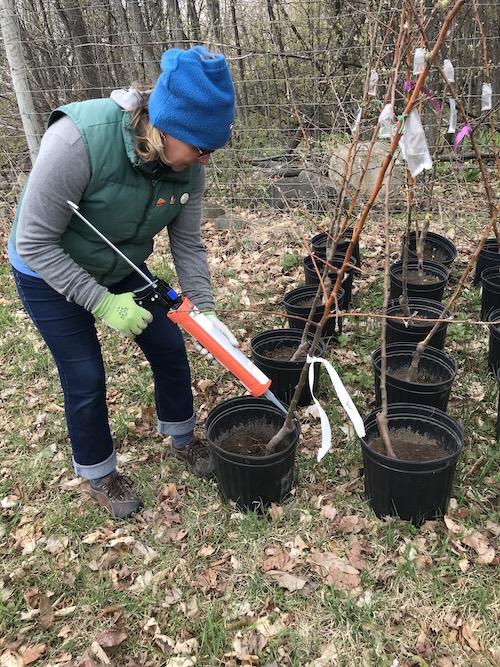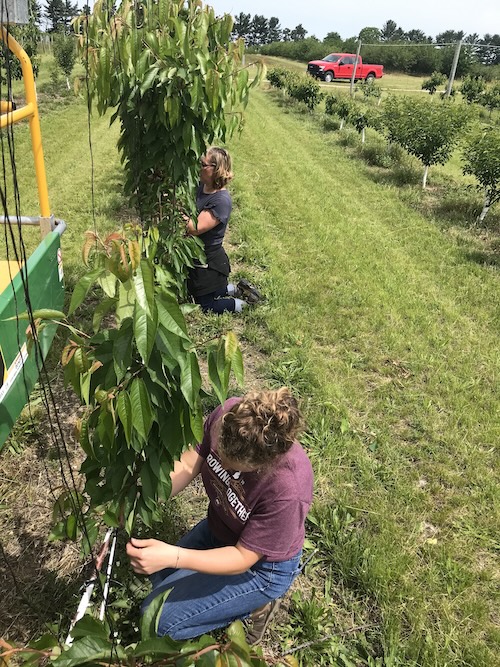From the sandy shores of Lake Michigan to the west and acres of orchards and wineries to the east, the northwestern Lower Peninsula of Michigan is a tourism wonderland. But for those who live and work there, this area is a different kind of wonderland — an ideal place for growing fruit.
According to the 2022 Census of Agriculture, there are 1,875 farms located in the five counties of Antrim, Benzie, Grand Traverse, Leelanau and Manistee in the northwestern Lower Peninsula. Of this total, 584 fruit and berry farms generated $116.5 million in sales in 2022.
And, the region’s most famous crops — cherries, grapes and apples — are coveted. In fact, this region produces almost half of the U.S. supply of tart cherries and is responsible for 83% of sweet cherry production in Michigan.
However, growing fruit in this beautiful region is not for the timid. Weather and pests are constantly challenging growers and, many times, these adversaries come out on top, resulting in economic loss and emotional stress for the growers.
But growers aren’t alone in this battle against nature — they have in their corner MSU’s Northwest Michigan Horticulture Research Center, or NWMHRC, located in Leelanau County among the fruit farms.
This 137-acre center was founded in 1979 by the area’s fruit growers who wanted a research center of their own — a place that could help with unique issues that come with growing fruit in a region unlike any other — so they turned to MSU.
The center is now the premier research site for integrated pest management, horticultural production and handling, value-added processing, marketing and farm financial management practices for sweet and tart cherries, wine grapes, apples, plums and hops. In addition to creating and expanding knowledge through leading-edge research on cherries and other fruits, the center disseminates state-of-the-art information to the Michigan fruit industry and the public.
“Our goal is to conduct research that’s valuable and directly applicable to the growers,” says Nikki Rothwell, MSU Extension specialist and coordinator of the research center. “Because the center is grower owned, we're really in tune with helping them solve myriad problems, from rodents, pests, tree fertility and dying, to economics farm transfer and estate planning. If I can’t directly help, I call my colleagues on campus or in the field and we can develop a team approach to solving or helping with the growers’ needs.”

Fruitful partnerships
Jim Nugent, former coordinator of the NWMHRC until his departure in 2007, remembers when the research station became the focal point for cherry research. When it came time to ask the industry for more support, the Michigan Tree Fruit Commission was born.
Nugent, former chair of the commission and a cherry grower from Suttons Bay, says the partnership with the center is essential in funding applied research and supplying critical information to growers.
“We have to keep our fruit industry on the cutting edge of research and technology if it’s going to survive, and that’s where the research center comes in,” Nugent says. “Though our industry is huge to the region, it’s relatively small so we don't have the private research and funding that other crops like corn or soy beans have.”
Kathy Garthe agrees. Garthe is a member of the Michigan Commission of Agriculture and Rural Development, and also is a fruit farmer with her husband, Gene, in Leelanau County’s Northport.
“The research station is critically important to Michigan agriculture,” Garthe says. “It can take so long for science to reach farmers, but having the station right in the heart of Northwest Michigan means important change and research can happen much more quickly. You can’t do the kind of research we need elsewhere or out of state due to our microclimate, which is why we need to continually invest in the research center.”
And then there’s the Michigan Cherry Committee, a coalition of all the growers, that also funds cherry research. Emily Miezio, treasurer of the committee and an owner of cherry orchards, says the research center plays a vital role in the region.
“The researcher center helps with the research, but for a lot of us on the committee, a call to Nikki Rothwell is the first call we make when we have questions regarding our crops,” Miezio says. “We’d be lost without the center.”
The ’strange’ pest
Growers reached out to Rothwell when the spotted wing drosophila, a very small fly native to Asia, first appeared in Michigan in 2010. It’s been destroying cherry crops ever since its invasion.
Rothwell says Michigan’s native fruit flies won't infest fruit until it's overripe, but not the spotted wing drosophila. It saws into just-ripe fruit and lays its eggs, ruining the crop.
“It’s a strange and devastating pest. We lost 25% of our cherry crop in 2016 and 2019, and it was bad again this year,” she says. “In the past, we just sprayed the heck out of the cherries because we didn't know enough about the pest. But we developed a novel model to guide the spray program. It’s based on fruit susceptibility, which is different from many insect models that are directly linked to the pest life cycle. Our model uses real-time weather data combined with how ripe the fruit is to determine when the cherries are most susceptible to the pest
The model is on the MSU Enviroweather system that feeds into weather stations and compiles risk levels to determine risk to growers — low, medium or high — and guides the spraying process.
“This model has helped growers spray much less so it’s economically and environmentally friendly,” Rothwell says. “It is great to do research that matters to growers and the way they produce fruit. Spraying less is also a big win for everyone.
“There are other universities that conduct fruit research, but the closer to home Michigan’s growers can get information and Michigan-based recommendations, the more likely the research is going to work on Michigan farms,” she added.

Contending with a changing climate
When you are a fruit grower in Michigan’s northwest Lower Peninsula, life is not always a bowl of cherries. Just ask John King, who owns King Orchards with his brother Jim.
“King Orchards had been very productive through the 80s and 90s, and then the weather started to get more and more goofy with extreme highs and lows,” King says. “We had a big snowstorm in early March 2012, and then the temperatures went up into the 80s for about two weeks. My fellow growers and the research center did everything we could, but only a miniscule number of cherries survived. It was devasting to the industry.”
King says heavy rainfalls have become more frequent due to climate change, which can destroy an orchard.
“We get droughts then heavy rains, which causes enormous erosion and washes off the tree spray, which then makes the crop vulnerable to the spotted wing drosophila” King says. “The research station’s efforts to help us mitigate damage has helped, but it’s all due to climate change.”
And 2024 proved challenging as well, with a mild winter followed by a quick warm up that brought a great deal of rain in spring and early summer.
“There definitely was a loss,” Miezio says. “Twenty percent of the country's sweet cherries come from Michigan. But this year's dreadful weather for growing means anywhere from 30% to 75% of the crop was lost.”
To help the growers, Rothwell has obtained new funding for climate resiliency research and another problem that has emerged from climate change — fire blight, a very destructive bacterial disease that affects apples and pears.
“Michigan is very vulnerable to climate change,” Rothwell says. “We rely on Lake Michigan to keep us warm in the fall and cool in the summer, and if we have mild winters where the lakes don't freeze, the fruit is very susceptible to spring frost/freeze events.
“And fire blight is a relatively new problem in our region. In the past, we never had warm enough springs to really grow the fire blight bacteria, but now spring weather is warmer and fire blight is an annual issue. We have been conducting research on how to combat this disease with fewer tools in the toolbox,” she adds.
The cherry on top: community
“When I think of the center, it’s not just for research — it’s a meeting place. It's a comfortable place for farmers to go and pull together, especially during difficult growing seasons,” Miezio says.
The fruit industry in Michigan is a relatively small community. In other bigger commodities, like corn and potatoes, there are many more for-profit companies helping those growers, but with apples and cherries, the research center and MSU play a big role in how these important crops are farmed.
“I see growers at the grocery store or their granddaughters at volleyball practice — it really is a closeknit community,” Rothwell says. “You truly see how valuable these farms are, but you also clearly see the economic pressures that surround farming, which is why I am so passionate about helping them make real change in the field. I want farming to continue to be an integral part of who we are in northwest Michigan.”
According the American Farmland Trust, despite the importance of agriculture to the region’s economy, a number of pressures combine to impact the financial viability of many farming operations. Unfortunately, when farms struggle, sometimes the best way out is to sell acreage.
“There’s huge pressure to turn our farmland into residential developments,” Garthe says. “We don’t want the last crop we grow to be asphalt.”
So, it’s about community and preservation.
“We need to work to preserve what we have — the beautiful watershed views, the orchards, healthy lakes and water systems,” Rothwell says. “We are a welcoming community and depend on tourism, but we also need to make sure the growers in our community are profitable so they do not have to sell valuable fruit-growing ground. I just can’t let that happen to our region and to our growers.”
The Northwest Michigan Horticulture Research Center is a stop on the 2024 Spartan Bus Tour.
Story update: On Oct. 15, 2024, the U.S. Department of Agricultureapproved disaster relief assistance for growers in Michigan's northwest Lower Peninsula after the region lost 75% of the sweet cherry crop due to the mild winter and the warm and wet early growing season, which led to significant insect and disease damage.
Nikki Rothwell, MSU Extension specialist and coordinator of the research center, had this to say about the disaster relief:
“The news from USDA Secretary Vilsack is certainly good, and we are appreciative of Gov. Whitmer and the secretary for recognizing the challenges for Michigan sweet cherry growers. These dollars will not be available for some time, so growers who are struggling right now may not have access to immediate assistance. We are trying other avenues to see if we can find more immediate relief.”